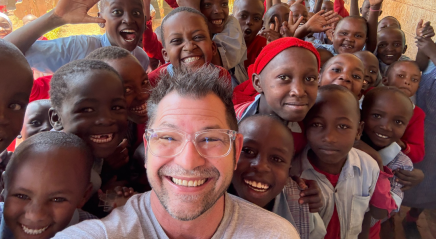I have served the HKBP California Batak Lutheran Church in Claremont, Calif., for the past eight years. At this time, HKBP California desires to become part of the Pacifica Synod and has called me once again to be their pastor.
I come from the northeastern region of Indonesia (North Sulawesi), with a background in the Reformed Church, while the congregation is from the western region (North Sumatra), rooted in Batak culture. We come from different cultures, customs and traditions.
As I reflect on my ministry in this congregation, I am reminded of the story of Ruth and Naomi in the Old Testament. Ruth, a Moabite, demonstrated her character as a newcomer among the Israelites. She serves as a powerful example of a foreign woman who lived faithfully among people who were not her own. Through her story, two different tribes and belief systems were united, even as she challenged the prevailing notion among the Israelites that Moabites were outsiders and unworthy. This story teaches us about compassion, loyalty, faith and God’s grace. It provides a profound example of how faith and love can bring hope and joy, even in the most difficult circumstances.
This congregation has experienced divisions in the past due to leadership conflicts. Yet, they have also shown the capacity to accept leaders with completely different backgrounds. Remarkably, they have become more loyal and engaged in church activities and programs.
Church ministry can flourish when it is carried out with sincerity and attentiveness, embracing all members equally. Church leaders are called to be examples—modeling good relationships, humility and empathy. Ruth’s story is a testament to character, courage and a faith that embraces great risk in order to live according to God’s true law. As leaders, we are taught to embrace humility and repentance. Challenges are opportunities to return to God with unwavering faith and devotion.
I believe that through love, loyalty, faith and the grace of God, we can serve and thrive in fellowship with those who are different from ourselves.
We do not need to change who we are to survive—we are all immigrants seeking to survive and thrive in the United States. As immigrants, we learn to adapt to new customs. Many in our congregation are well-educated and came here with aspirations for a better life. Yet, with the current issues surrounding immigration, many feel uneasy. As church leaders, it is our duty to offer them peace of mind and help them trust in their ability to pursue a decent and dignified life here.
We seek to offer strength, peace and encouragement to help them face struggles related to their immigration status. We support them not only spiritually but practically, helping them find solutions, feel safe and work with dignity. This requires patience and humility from church leaders, who must nurture strong relationships with the congregation—reaching out through calls, visiting the sick, praying for the burdened and even accompanying members to immigration court when needed.
I do not feel like a stranger here, because I live among their families. I know their parents and relatives in Indonesia. I love them as my own family—because we no longer have extended families here, this congregation has become our family.
When the congregation decided to become part of the ELCA, I took courses to deepen my understanding of Lutheran theology. With patience and dedication, I studied—despite English being my second language. I have also worked to apply Lutheran theology within the congregation. Though they come from a Lutheran background (Huria Kristen Batak Protestant or Batak Christian Protestant Church), there are aspects of ELCA tradition that require guidance and adaptation—such as differences in liturgy, communion and baptismal practices. In these matters, I have patiently introduced the practices and understanding embraced by the ELCA.
For now, I continue to combine both worship methods. Some members remain deeply loyal to the traditional HKBP way, and it can be difficult to bring about change. I must approach these situations with care, explaining the reasons behind the changes gently, so that they can understand and accept the meaning behind them.
When members disagree with the way I conduct worship, I try to introduce changes gradually, step by step, to help them adjust and become familiar with the new practices and understanding. Receiving criticism—especially rejection—from the congregation is never easy. However, I remain committed to doing my best for the spiritual growth of the congregation. My goal is that, over time, they will embrace the changes with full loyalty and foster strong, healthy relationships within the fellowship.









